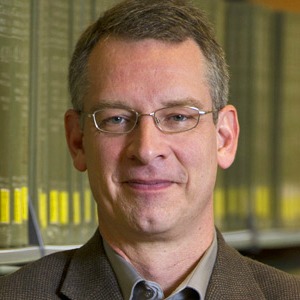Brad Gregory Discusses the Unintended Consequences of the Reformation
"Mind-blowing." That is how one student described Brad Gregory's talk, "The Reformation Era and the Making of Modernity," delivered last Wednesday, October 15, 2015, as part of Grand Rapids Notre Dame Alumni Club Hesburgh Lecture, and co-sponsored by Aquinas College's Catholic Studies Program and the Saint Benedict Forum.
 Gregory began his talk by asking, "How did the world we live in today come to be as it is?" The West today, he argued, is characterized by pervasive all-encompassing institutions and market capitalism as well as a bewildering plurality of conflicting open-ended truth claims. How did we get this way? Most accounts begin with the the Enlightenment, the scientific and industrial revolutions, the American and French Revolutions, but Gregory argued that these, while important, must be understood in light of the 16th century doctrinal conflicts of the Reformation. And to understand the Reformation and its consequences, we need to understand the medieval world in which it occurred.
Gregory began his talk by asking, "How did the world we live in today come to be as it is?" The West today, he argued, is characterized by pervasive all-encompassing institutions and market capitalism as well as a bewildering plurality of conflicting open-ended truth claims. How did we get this way? Most accounts begin with the the Enlightenment, the scientific and industrial revolutions, the American and French Revolutions, but Gregory argued that these, while important, must be understood in light of the 16th century doctrinal conflicts of the Reformation. And to understand the Reformation and its consequences, we need to understand the medieval world in which it occurred.
The medieval world was complicated and multi-layered, but one peculiar dimension of it is most notable: religion permeated every aspect of human reality. The Catholic Church was the recognized authority which governed the claims of that religion, so when the Reformation rejected the Catholic Church it was bound to affect all aspects of life which had been informed by those truth claims. This rejection and the rival claims to Christian truth had unintended--and undesirable--consequences for the future. With sensitivity and scholarly rigor, Gregory traced these unintended consequences from the rallying cries of the Reformers--"Here I stand" and sola Scriptura--to our contemporary situation. He claimed that the Reformers would be horrified by many aspects of our modern world, but they unwittingly set the stage for it.
Brad Gregory is Dorothy G. Griffin Professor of Early Modern European History at Notre Dame University. His talk was based on his recent book, The Unintended Reformation: How a Religious Revolution Secularized Society.
